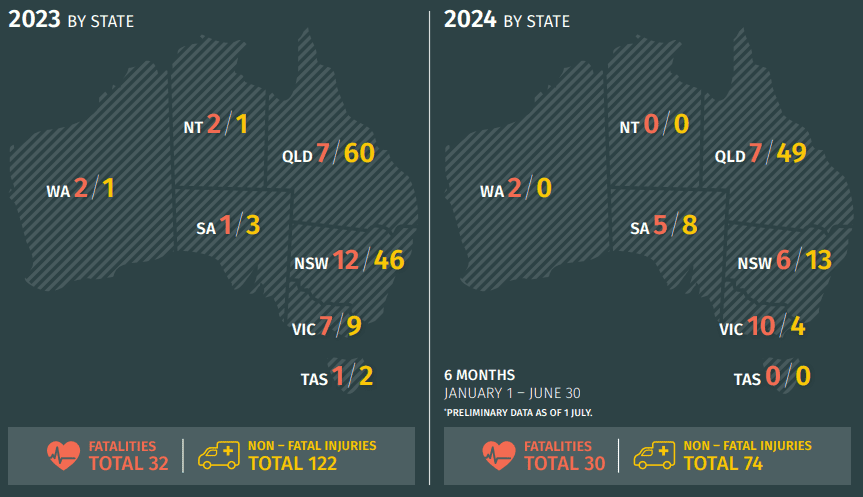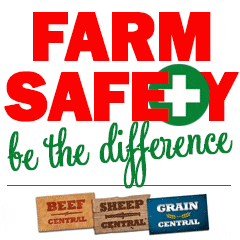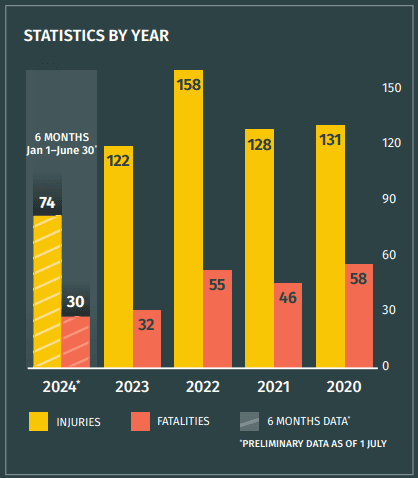
In the first six months of 2024, farm accidents have caused 30 deaths and 74 injuries versus the full-year figure from 2023 of 32 deaths and 122 injuries. Image: Farmsafe Australia
FARMSAFE Australia is encouraging farm businesses to embrace safety as a personal responsibility as part of the annual National Farm Safety Week running from July 14-20.
The In Safe Hands campaign aims to redefine safety in agriculture as a personal commitment to taking care of farmers, farming families and farm workers, and celebrates the everyday actions that contribute to a safer farm environment.
 The launch of the campaign coincides with the release of the 2024 Safer Farms Report, which details alarming statistics regarding on-farm deaths for the first half of 2024.
The launch of the campaign coincides with the release of the 2024 Safer Farms Report, which details alarming statistics regarding on-farm deaths for the first half of 2024.
While there was a significant decrease of 44 percent in on-farm fatalities in 2023, the first six months of 2024 have been tragic, with 30 farmers already losing their life.
The total number of on-farm deaths for the past six months is just two fewer than the overall figure for 2023.
Victoria saw the highest number of on-farm fatalities for first-half 2024 at 10, followed by Queensland with seven, and New South Wales at six.
There have been 74 non-fatal injuries in the past six months, compared to a total of 122 incidents recorded in 2023.
Farmsafe Australia chair Felicity Richards said the concerning rise in fatalities for the first half of 2024 reminds the industry that “our work is far from over”.
“We must continue to commit to building safer cultures across our workforce to protect the lives of those who live and work on Australian farms,” Ms Richards said.
Grain-sheep and grain-beef farming tops the list of agricultural operations involving an injury or fatality incident over the past year, accounting for 52.46pc of cases.
This is followed by beef cattle farming at 18pc of incidents, road freight transport on 17pc and electrical at 13pc.

Fatalities and injuries significantly dropped in 2023, but the first half of 2024 has seen a troubling rise in on-farm incidents. Photo: FarmSafe
In the past 12 months, liability claims have decreased overall with across most segments including falls from heights down 75pc and impact injuries reduced by 30pc.
Data highlights that key risk areas continue to centre around heavy machinery, large animals, and exposure to severe weather events, with farm property damage claims stemming from natural peril events increasing by 32pc over the past year.
Fatigue and loss of concentration were frequently reported as contributing factors to machinery incidents, in addition to omitting important safety steps to execute tasks more rapidly.
Self-managed repairs to broken down machinery was recorded as a leading cause of injury, with examples of machinery not being properly disengaged prior to repairs commencing.
Qld holds launch
Darling Downs cotton grower Jamie Grant hosted the Qld launch of National Farm Safety Week at his Jimbour property.
The event provided attendees with the opportunity to connect with other growers and exchange practical safety tips.
Mr Grant emphasised the importance of training for farm safety.
“People have got to be better trained,” Mr Grant said.
“It’s not a matter of hitting people on the head because they’re doing something wrong, it’s teaching them how to do it in the first place.”
NSW workshops
State farming organisation NSW Farmers is marking the week by hosting a series of workshops across regional centres to provide attendees with practical tips and updates to ensure they can keep their farm businesses safe and compliant with the latest workplace health and safety requirements.
NSW Farmers workplace relations spokesperson Chris Stillard said National Farm Safety Week highlighted the potential dangers associated with the industry and reminded farmers to stay proactive on WHS.
“National Farm Safety Week is the perfect time to kickstart those conversations around how we can all contribute to improving our physical and mental health, safety and wellbeing on-farm,” Mr Stillard said.
“Farming is a rewarding but potentially dangerous occupation, and the more we talk about the risks and dangers, the better.
“Small, simple-to-implement steps such as storing chemicals correctly or wearing helmets when it’s necessary all go a long way to ensuring everyone can stay safe and healthy on-farm.”
The workshops will be held this week in Tamworth, Dubbo, Forbes, Griffith, and Wagga Wagga on various days.
NHVR, ALRTA highlight concerning trend
In response to the 2024 Safer Farms Report, the National Heavy Vehicle Regulator and Australian Livestock and Rural Transporters Association have urged all parties in the Livestock supply chain across the country to follow safer transport practices, following 14 crashes involving livestock in the first four months of 2024.
NHVR chief executive officer Sal Petroccitto said this year’s statistics are alarming, and the NHVR is working collaboratively with the livestock industry to ensure this trend does not continue.
“If the same rate continues, the number of crashes this year involving livestock could nearly double last year’s total, a devastating outcome for the industry and community,” Mr Petroccitto said.
“Farm safety is a shared responsibility, and preventing crashes requires attention from all stakeholders in the agricultural and livestock sector.”
ALRTA executive director Rachel Smith said that transporters work with the farming community to safely transport goods and livestock from paddock to plate and from farm gate to market.
“Providing proper heavy-vehicle access, safe on-farm infrastructure, and maintaining effective communication with transport operators and drivers helps keep Australian agriculture safe, sustainable, and profitable,” Ms Smith said.
The NHVR has partnered with the livestock industry to develop new Regulatory Advice to improve safety and simplify the Heavy Vehicle National Law (HVNL) primary duty and the Chain of Responsibility (CoR) for parties in the livestock industry.
The Regulatory Advice – Livestock provides guidance for managing heavy vehicle safety risks and helps ensure all parties, from primary producers to transport operators to facility owners to stock agents, understand their responsibilities.
Source: FarmSafe, WFI Insurance, NSW Farmers, Cotton Australia, NHVR

HAVE YOUR SAY